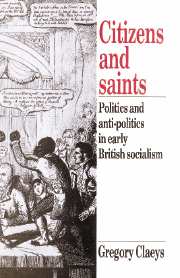Book contents
- Frontmatter
- Contents
- Acknowledgements
- List of Abbreviations
- Introduction:
- PART I THE ROOTS OF POLITICAL AND ANTIPOLITICAL SOCIALISM
- PART II SOCIAL SCIENCE, POLITY AND ECONOMY
- PART III THE ORIGINS OF SOCIAL RADICALISM
- 5 Owenism and the emergence of social radicalism, 1820–35
- 6 Owenism and Chartism, 1836–45
- 7 The legitimation of political socialism
- 8 Social radicalism, the state and revolution
- Bibliography
- Index
7 - The legitimation of political socialism
Published online by Cambridge University Press: 04 December 2009
- Frontmatter
- Contents
- Acknowledgements
- List of Abbreviations
- Introduction:
- PART I THE ROOTS OF POLITICAL AND ANTIPOLITICAL SOCIALISM
- PART II SOCIAL SCIENCE, POLITY AND ECONOMY
- PART III THE ORIGINS OF SOCIAL RADICALISM
- 5 Owenism and the emergence of social radicalism, 1820–35
- 6 Owenism and Chartism, 1836–45
- 7 The legitimation of political socialism
- 8 Social radicalism, the state and revolution
- Bibliography
- Index
Summary
Although Owen's personal influence was largely eradicated after the Queen wood dèbâcle, this did not signal the complete demise of Owenism either as a movement or as an intellectual phenomenon. But the main organisations built up painstakingly over a decade dissolved fairly quickly. Unable to survive on cultural events alone, some remaining branches dissolved into secularist, self-help or educational institutions, and, as the communitarian wave passed, attempted to reinterpret the meaning of the ideals to which they had become committed. G. J. Holyoake, for example, set out to give socialism a more individualist foundation in which the ideas of self-formation and personal responsibility could play a greater role. A few Owenite leaders who could afford it retreated into mystical withdrawal. Others slid into bohemianism. Socialism, Lloyd Jones lamented, had become by the mid-1840s ‘a receptacle for all moral and intellectual delinquents – empty-headed young men bordering on idiocy, babblers and quibblers, long haired, bearded and vegetarians, etc’. For at least some of its votaries, Owen's plan had become synonymous with the new eccentric world where individual self-expression signified the beginning of the super session of irrational social prejudices. At least the threat of uniformity seemed to have passed.
But a number of Owenites did not lose faith in the possibility of collective change, and went on to contribute to the last upsurge in practical socialist reform of this period during and after 1848. Those who participated in these final exertions came to embrace a much more political programme than Socialism had ever officially countenanced before 1845. They also became much more predisposed to entering into an alliance with the radical reformers.
- Type
- Chapter
- Information
- Citizens and SaintsPolitics and Anti-Politics in Early British Socialism, pp. 261 - 284Publisher: Cambridge University PressPrint publication year: 1989

